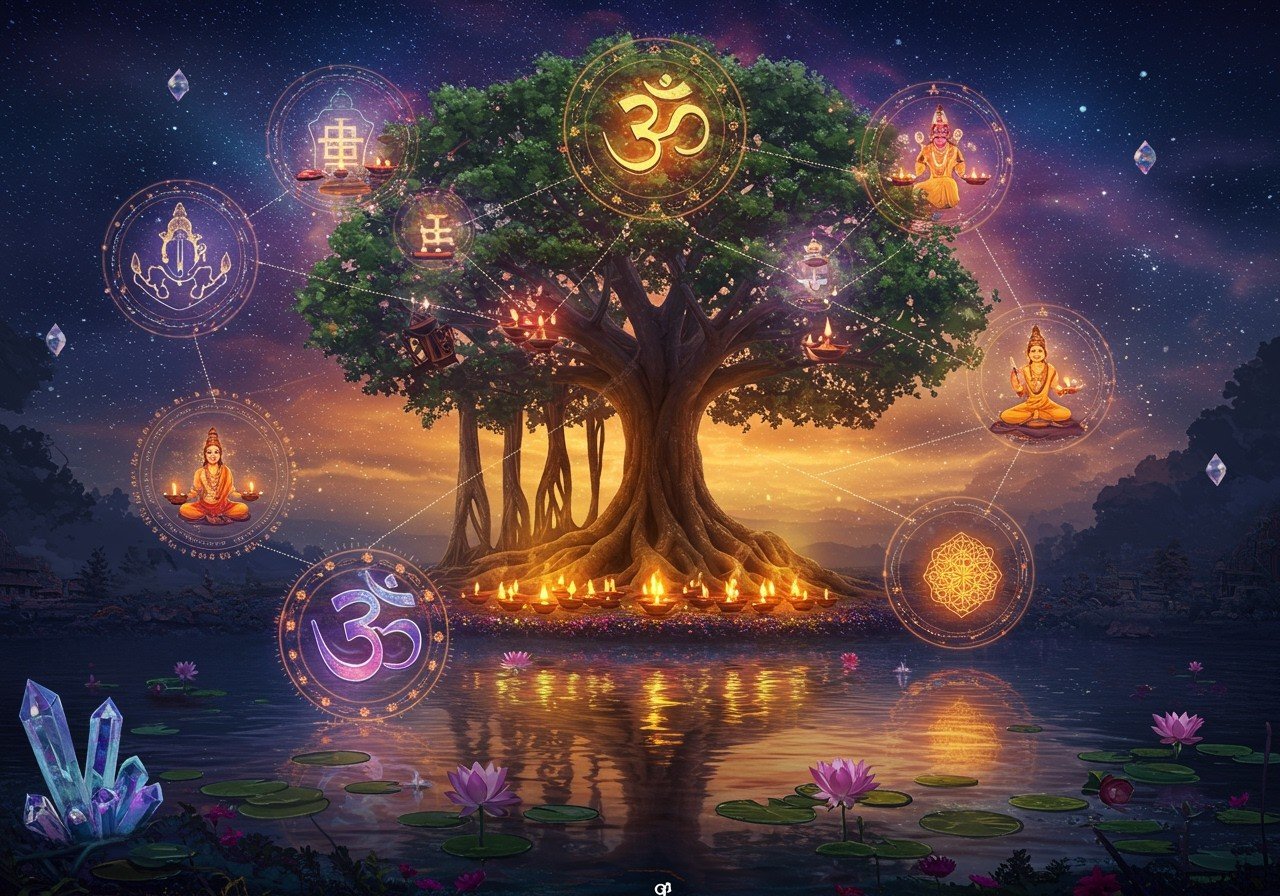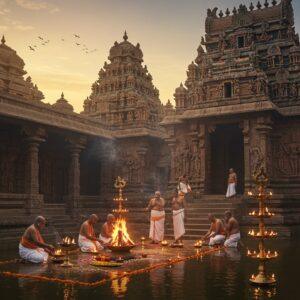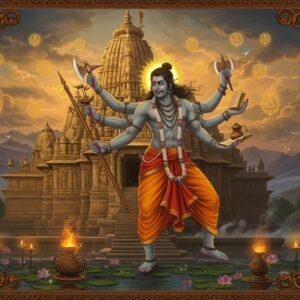
Hinduism, a captivating mosaic of spiritual and philosophical traditions, stands as the world’s third-largest religion, embracing around 1.2 billion adherents globally (approximately 15% of the world’s population as of 2024). Its profound influence on India’s cultural and spiritual landscape is undeniable. More than just idol worship, Hindu beliefs delve into a profound understanding of the divine, weaving seamlessly into the daily lives of millions, particularly those cherishing their spiritual heritage. This exploration ventures beyond simplistic notions of polytheism to illuminate the nuanced perspectives on God within Hinduism.
Core Beliefs within Hinduism
Hindu beliefs are multifaceted and intricate. At their heart lies Brahman, the ultimate, formless, and infinite reality. Deities such as Vishnu, Shiva, and Devi embody different facets of the divine. Avatars, like Krishna and Rama, manifest divine principles on Earth. Ishvara, the concept of a personal God, is central to individual devotion. The Trimurti—Brahma, Vishnu, and Shiva—plays a pivotal role in the universe’s cyclical nature. Hinduism’s syncretic character allows for a spectrum of paths and beliefs about God, enriching our appreciation of this ancient tradition. Let’s delve deeper into some of the core tenets:
- No Single Founder: Hinduism organically evolved over millennia, a confluence of diverse beliefs and philosophies, not attributed to a single founder. It’s a testament to its adaptability and enduring relevance.
- Henotheism: While recognizing a pantheon of gods and goddesses, most Hindu traditions are henotheistic, focusing worship on a single deity, often Brahman, the ultimate reality, while acknowledging other deities as manifestations of the same divine source. A 2024 survey showed that a significant majority (61%) of Hindus believe in one God with multiple manifestations.
- Atman and Brahman: The concept of Atman (the individual soul) and Brahman (the supreme soul) is fundamental. Every living being possesses an Atman, a spark of the divine Brahman, emphasizing the interconnectedness of all life. The two are essentially one and the same, reflecting the divine within each being.
- Reincarnation and Karma: Samsara, the continuous cycle of life, death, and rebirth, and Karma, the universal law of cause and effect, are central beliefs. Actions in this life influence future rebirths, guiding individuals towards spiritual evolution.
- Dharma: Dharma, the ethical and moral code of conduct, guides Hindus towards righteous living. It emphasizes fulfilling one’s duties and responsibilities in accordance with cosmic order. It shapes an individual’s life, guiding actions and interactions within society.
- Deities: The Hindu pantheon is vast. While some view deities as facets of a single ultimate reality, others may focus on a specific deity as supreme. Shiva, Ganesha, and Lakshmi are among the many deities that Hindus feel a close connection to, each representing unique aspects of the divine.
- Acceptance of Other Faiths: Hinduism is inherently inclusive, acknowledging the validity of other religious paths. This acceptance fosters tolerance and interfaith dialogue.
- Goal of Life (Moksha): The ultimate aim in Hinduism is Moksha (liberation), the release from the cycle of rebirth and the union with Brahman. This pursuit of self-realization shapes spiritual practice.
- Sacred Texts: The Vedas, Upanishads, Puranas, Mahabharata (including the Bhagavad Gita), and Ramayana are among the key scriptures that guide Hindu beliefs and practices. These texts offer profound insights into the nature of reality and the path to spiritual enlightenment.
Hindu Practices
Hindu practices are as diverse as its beliefs, offering a wide array of ways to connect with the divine. From daily rituals to grand festivals, these practices reflect the vibrant tapestry of Hindu spirituality.
- Puja: Puja, the act of worship, is often performed in temples (Mandirs) but can also be practiced at home, often in a dedicated shrine. It involves offerings, prayers, and rituals to honor the deities. Creating a sacred space at home allows for daily connection.
- Bhakti: Bhakti, devotional love and reverence for a chosen deity, is a central practice. It often involves chanting (japa), singing devotional songs, and expressing deep emotional connection with the divine. This path emphasizes personal connection through love and devotion.
- Samskaras (Rites of Passage): Samskaras are life-cycle rituals performed at key stages of life, marking transitions and seeking divine blessings. These rituals, often conducted in temples, underscore the spiritual significance of life’s milestones.
- Yoga and Meditation: Yoga and meditation are practiced for physical and mental well-being, as well as for spiritual growth. They are pathways to self-discovery and inner peace.
- Pilgrimage: Pilgrimages to sacred sites, temples, and natural locations hold deep spiritual significance. While not obligatory, these journeys are seen as opportunities for purification and connection with the divine. Visiting these powerful places is believed to offer blessings and spiritual renewal.
- Festivals: Hindu festivals, often tied to the lunar calendar, celebrate various deities and events. Diwali, the festival of lights, is a prime example, symbolizing the triumph of good over evil. These festivals are vibrant expressions of faith and community.
- Four Paths to Self-Realization: Hinduism encourages seekers to pursue self-realization through four main paths: Karma Yoga (path of action), Bhakti Yoga (path of devotion), Raja Yoga (path of meditation), and Jnana Yoga (path of knowledge). These paths cater to different temperaments and offer diverse approaches to spiritual growth.
- Daily Rituals: Many Hindus incorporate daily rituals into their lives, such as morning prayers, offerings, and scriptural readings. These practices maintain a consistent connection with the divine and integrate spirituality into daily life. This routine reinforces faith and provides a sense of grounding.
How Poojn.in Supports Your Spiritual Journey
Poojn.in, India’s leading provider of cultural and spiritual goods, offers a wide selection of authentic products to enhance your connection with Hindu deities and practices:
- Complete Puja Kits: These comprehensive kits contain everything needed for specific deity worship, simplifying preparation and ensuring authenticity.
- Sacred Idols (Murtis): Poojn.in provides beautifully crafted murtis of various Hindu deities in high-quality materials like brass and copper, allowing for reverent home worship. These idols serve as focal points for devotion.
- Ritual Items: From diyas and kalash to bells and other traditional items, Poojn.in offers a complete range of authentic ritual accessories. These items enhance the sanctity of your puja.
- Worship Accessories: Find pure cotton wicks, camphor, and other specialized puja items to enhance your worship experience. These small but essential components ensure the proper conduct of rituals.
- Vedic Books: Explore a collection of religious texts and guides to deepen your understanding of Hindu gods, goddesses, and practices. These resources offer valuable insights for both beginners and seasoned practitioners.
- Yantra Collection: Poojn.in offers a range of Yantras. Explore our collection online. These sacred geometric diagrams enhance focus and are used to invoke specific deities.
- Natural Incense: Enhance the atmosphere of your puja with pure dhoop and agarbatti from Poojn.in. These fragrant offerings create a sacred ambiance.
Visit www.poojn.in to discover our extensive range of authentic puja items. We provide reliable shipping across India with secure packaging, ensuring your items arrive safely. Our dedicated customer service team is available to assist you in selecting the perfect items for your spiritual needs. Experience the convenience and authenticity of online shopping for your puja essentials.
Conclusion
Hinduism’s intricate tapestry of beliefs and traditions provides a profound understanding of the divine, seamlessly blending ancient wisdom with contemporary life. Whether through philosophical exploration or devotional practices, Hinduism embraces diverse paths for connecting with the divine. This rich diversity not only nurtures personal spirituality but also strengthens community bonds through shared rituals and vibrant festivals.
As our world evolves, Hindu practices adapt, finding new expressions while maintaining their core essence. By honoring these traditions and embracing the conveniences of modern life, Hindu beliefs remain vibrant and relevant. This balance ensures that our rich spiritual heritage continues to guide and inspire future generations, keeping the sacred connection alive from ancient times to the present day.
Frequently Asked Questions about Hindu Beliefs
What is the fundamental belief concerning God in Hinduism? Hinduism centers around the concept of Brahman, the supreme, formless, and infinite being. Brahman manifests in various forms, allowing devotees to connect with the divine through different deities, accommodating individual preferences and regional traditions. This understanding of God distinguishes Hinduism from many other religions.
In what ways does the Hindu understanding of God differ from other faiths? Unlike many religions that emphasize a single form of God, Hinduism embraces a multiplicity of deities, each representing different aspects of the divine. This multifaceted approach allows for a personalized connection with the sacred.
Why does Hinduism have so many gods and goddesses? The multitude of deities in Hinduism symbolize diverse aspects of life, nature, and cosmic forces. Each deity embodies specific qualities, enabling devotees to form relatable connections with the divine while recognizing the interconnectedness of all existence.
Is it mandatory for all Hindus to worship the same deities? No, Hinduism grants individuals the freedom to choose their preferred deities for worship. Personal beliefs, family traditions, regional customs, and individual inclinations all play a role in shaping personal devotion.
What is the significance of rituals in Hindu beliefs about God? Rituals in Hinduism serve as a bridge between devotees and the divine. They provide a tangible means of expressing devotion, seeking blessings, and strengthening one’s spiritual connection. Rituals are integral to the practice of Hindu beliefs.
How do Hindu beliefs perceive the relationship between human beings and God? Hinduism sees an inherent interconnectedness between humans and God. The individual soul (Atman) is viewed as a part of the universal spirit (Brahman), with the ultimate goal being the realization of this unity through spiritual growth. This concept of interconnectedness permeates Hindu philosophy.
Does the concept of heaven and hell exist in Hindu beliefs? Hinduism’s focus lies on karma and reincarnation, rather than the traditional Western concepts of heaven and hell. Good deeds lead to favorable rebirths, while negative actions may result in less desirable future lives, emphasizing personal responsibility and spiritual evolution.
Why is it beneficial for non-Hindus to understand Hindu beliefs? Understanding Hindu beliefs cultivates cultural appreciation, fosters respect, and promotes interfaith harmony. It provides insights into a diverse worldview and encourages tolerance in an increasingly interconnected global society. Learning about other faiths enriches our understanding of humanity.


